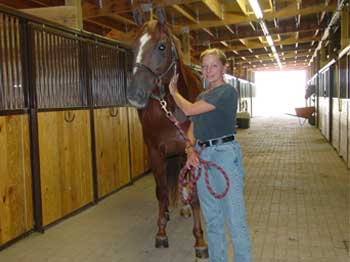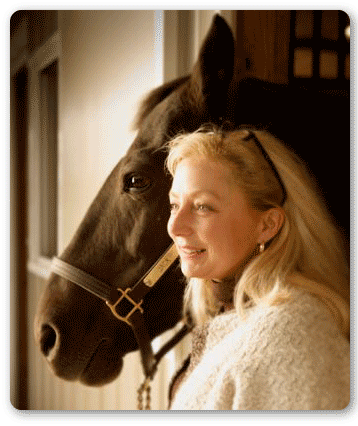Goal Setting for 2007

Goal setting is an important part of being involved with horses, regardless of your discipline, training level or show schedule. Even if your aspirations aren't to ride in the Olympics or compete at the most prestigious show for your discipline, you can still benefit from setting goals for yourself and your horse. By writing down your goals, you can see what you've accomplished, what you need to work on, and other things you may want to try.
What do you want to accomplish with your horse training goals this year?
Write down some specific, realistic things you'd like to accomplish. Make sure the goals are things that can be measured and that they are completely dependent on you, not on someone else. For example, if you're a trail rider who sticks to the local trails and parks but has always dreamed of doing more, set a goal to try out a new trail. Choose a place that accommodates horses, is within a distance you feel comfortable traveling, and make it your goal to try out that trail at least one time before the end of the year. If you're in a training program, talk with your trainer about the goals you are interested in. He or she can make suggestions that will challenge you and your horse, but will also help you choose goals that are achievable. Your trainer will also be able to evaluate your progress along the way and help you adjust your goals as necessary.
When deciding on your horse training goals, apply your own style and personality.
If you're a backyard rider who would like to socialize more with other riders, but you have no interest in attending shows, don't make it your goal to attend five shows in 2007. Instead, focus on something you would truly enjoy, such as joining a local riding club or inviting a friend or neighbor over to your house to ride with you once a month.
Don't let your horse riding and horse training goals overwhelm you!
Prioritize your list and start with the goals you want to achieve most. Think about the strategies you need to employ to reach each of your goals and jot those down as well. Riders who compete may have aspirations of winning the most prestigious title in their discipline, but that can be a lofty goal for a novice. Think about the steps that are required to get to that title, and break them up into manageable chunks. What do you need to do in order to achieve that first step? Do you need to work with a trainer or find a better horse? Are those strategies you can afford at this time?
Look at your horse riding and horse training goals at the end of each year. Did you hit your goals?
Did you achieve any of them? Did you achieve all of them? Maybe it's time to take things to the next level and make 2007 even more challenging for you and your horse. Perhaps the goal of trying a new discipline will work for you. If you feel that you didn't reach your goals, think about why. Were they within your reach? Did outside factors make it impossible? Try some things that are easier to attain in 2006, and challenge yourself more as the year goes on and you begin to enjoy some success.
Goal setting is applicable to every aspect of equine enjoyment. Goals help us move forward and grow as equine owners. So, think about what you'd like to achieve, make it manageable, write it down and track your progress through the year. With a little goal setting, who knows what kind of activities and successes you'll enjoy next year.
The family and staff at RAMM wish you and your horses a happy, safe and productive New Year!
 Debbie has over 45 years experience with horses and equine-related businesses. She has owned, trained, boarded horses and run stables at various times in her career. She is a certified fence installer, has given balanced riding lessons, and has shown horses in Western, Western Pleasure, Trail, English, Hunter/Jumper, Fox Hunting, Hunter Trials, Dressage and driving classes. Debbie has been involved in foaling, and just about every aspect of horse ownership possible, and she welcomes your questions and comments. If you are interested in using any articles by Debbie, please send her an email.
Debbie has over 45 years experience with horses and equine-related businesses. She has owned, trained, boarded horses and run stables at various times in her career. She is a certified fence installer, has given balanced riding lessons, and has shown horses in Western, Western Pleasure, Trail, English, Hunter/Jumper, Fox Hunting, Hunter Trials, Dressage and driving classes. Debbie has been involved in foaling, and just about every aspect of horse ownership possible, and she welcomes your questions and comments. If you are interested in using any articles by Debbie, please send her an email.
RAMM Fence Systems, Inc. makes every effort to provide reliable and useful information on horse health, care and products. The statements made on this website are based on years of experience with horses, however, they are based on generalized situations and should not replace diagnosis or treatment by a veterinarian or consultation by a professional. RAMM Fence Systems, Inc. does not assume any legal responsibility. Readers should always consult qualified health care providers for specific diagnosis and treatment.
